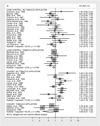Cigarette smoking is a risk factor for Alzheimer's Disease: an analysis controlling for tobacco industry affiliation
- PMID: 20110594
- PMCID: PMC2906761
- DOI: 10.3233/JAD-2010-1240
Cigarette smoking is a risk factor for Alzheimer's Disease: an analysis controlling for tobacco industry affiliation
Abstract
To examine the relationship between smoking and Alzheimer's disease (AD) after controlling for study design, quality, secular trend, and tobacco industry affiliation of the authors, electronic databases were searched; 43 individual studies met the inclusion criteria. For evidence of tobacco industry affiliation, http://legacy.library.ucsf.edu was searched. One fourth (11/43) of individual studies had tobacco-affiliated authors. Using random effects meta-analysis, 18 case control studies without tobacco industry affiliation yielded a non-significant pooled odds ratio of 0.91 (95% CI, 0.75-1.10), while 8 case control studies with tobacco industry affiliation yielded a significant pooled odds ratio of 0.86 (95% CI, 0.75-0.98) suggesting that smoking protects against AD. In contrast, 14 cohort studies without tobacco-industry affiliation yielded a significantly increased relative risk of AD of 1.45 (95% CI, 1.16-1.80) associated with smoking and the three cohort studies with tobacco industry affiliation yielded a non-significant pooled relative risk of 0.60 (95% CI 0.27-1.32). A multiple regression analysis showed that case-control studies tended to yield lower average risk estimates than cohort studies (by -0.27 +/- 0.15, P=0.075), lower risk estimates for studies done by authors affiliated with the tobacco industry (by -0.37 +/- 0.13, P=0.008), no effect of the quality of the journal in which the study was published (measured by impact factor, P=0.828), and increasing secular trend in risk estimates (0.031/year +/- 0.013, P=0.02). The average risk of AD for cohort studies without tobacco industry affiliation of average quality published in 2007 was estimated to be 1.72 +/- 0.19 (P< 0.0005). The available data indicate that smoking is a significant risk factor for AD.
Figures


References
-
- Brookmeyer R. Forecasting the global prevalence and burden of Alzheimer's disease. Alzheimers Dement. 2007;3:186–191. - PubMed
-
- Meyer JS, Rauch GM, Rauch RA, Haque A, Crawford K. Cardiovascular and other risk factors for Alzheimer's disease and vascular dementia. Annal N Y Acad Science. 2000;903:411–423. - PubMed
-
- Bazzano LA, He J, Muntner P, Vupputuri S, Whelton PK. Relationship between cigarette smoking and novel risk factors for cardiovascular disease in the United States. Ann Intern Med. 2003;138:891–897. - PubMed
-
- Ockene IS, Miller NH. Cigarette smoking, cardiovascular disease, and stroke a statement for healthcare professionals from the American Heart Association. Circulation. 1997;96:3243–3247. - PubMed
-
- Almeida OP, Hulse GK, Lawrence D, Flicker L. Smoking as a risk factor for Alzheimer's disease: contrasting evidence from a systematic review of case-control and cohort studies. Addiction. 2002;97:15–28. - PubMed
Publication types
MeSH terms
Substances
Grants and funding
LinkOut - more resources
Full Text Sources
Medical
Miscellaneous

